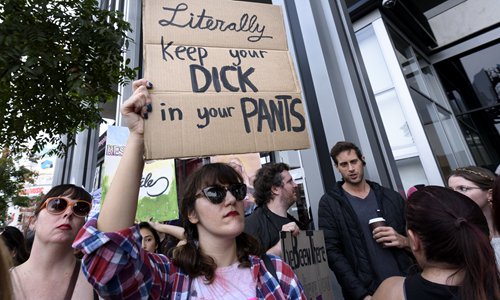HOME >> WORLD
Man walks free as verdict reversed in South Korea #MeToo case
Source:AFP Published: 2020/1/9 21:18:40

Protesters attend a Me Too rally to denounce sexual harassment and assaults of women in Los Angeles, California on November 12, 2017. The rally was inspired by a social media campaign #MeToo which went viral following the allegations of sexual misconduct and rape against Hollywood producer Harvey Weinstein. Photo: IC
A former prosecutor who was tried following groping allegations that fuelled South Korea's #MeToo movement walked free on Thursday after his conviction was quashed by the country's top court.Ahn Tae-geun, 53, was jailed for two years for abuse of power in January 2019 after being accused of repeatedly groping a female junior colleague at a funeral in 2015.
After Seo Ji-hyun filed a formal complaint, Ahn allegedly had her transferred to a provincial post, significantly impacting her career.
Seo went public with a tearful live television interview in 2018, which triggered a flood of similar accusations against powerful men in fields ranging from art to politics that grew into a South Korean #MeToo movement.
Despite its economic advances, the South remains a patriarchal society, and has one of the world's thickest glass ceilings for women.
Ahn - who was separately fired for corruption in 2017 - could not be charged with sex abuse because the one-year statute of limitations had expired.
Instead he was indicted for abuse of power, accused of using his position to pressure senior prosecutors to reassign Seo to a junior position in revenge.
An appellate court had upheld the original ruling in July, but the Supreme Court on Thursday quashed the decision and ordered a retrial, saying it was difficult to conclude one of Ahn's actions - asking a prosecutor to write a document related to Seo's transfer to a provincial post - was a form of power abuse.
The initial trial ruling "misunderstood legal principles on the crime of abuse of official authority," the Supreme Court said in a statement. "The original verdict is quashed and the case is sent back for re-review and a new decision."
The victim's lawyer Seo Gi-ho said he "cannot possibly comprehend" the Supreme Court's decision, adding it had interpreted the definition of abuse of authority "too narrowly" in reaching its ruling.
Jung Ha Kyung-ju, a women's rights activist in Seoul, said the situation was "very concerning," particularly as the decision had been made by the South's highest court. "This says a lot about how this country has been treating women and the power abuse they experience at work," she said.
Posted in: ASIA-PACIFIC